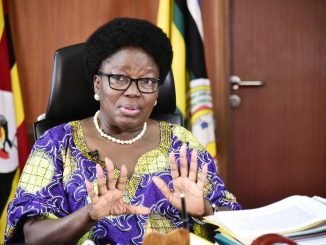
Kampala, Uganda | By Michael Wandati | In a recent acknowledgment, Mr. Thomas Tayebwa, the Deputy Speaker of Parliament, commended the Uganda Police Force for their unwavering commitment to maintaining law and order, even in the face of challenging living and working conditions.
This commendation came after Mr. Tayebwa received a comprehensive report on the working and living conditions of police personnel from Ms. Mariam Wangadya, the Chairperson of the Uganda Human Rights Commission (UHRC) titled; ‘Squeezing Water out of a Stone? Working and living conditions of the Uganda Police Force personnel and their implications on observance of human rights.’
“Junior personnel were the most disadvantaged in terms of acquiring decent housing as they were often displaced from institutional accommodation by senior personnel. Some personnel opted to live in their homes or voluntarily rent outside institutional accommodation but these faced concerns about their personal security outside the barracks as well as affordability of decent housing that maintains the corporate image of UPF,” Ms. Wangadya defended the title of the research paper arguing that Uganda’s police personnel were giving a lot more than they were receiving.

Ms. Wangadya added that many Police Officers lived between 3-8kms away from workstation, while 3 percent lived more than 8kms away even up to 14kms and despite this, the administration of Uganda Police did not facilitate their staff with organised transport to and from work yet they were on call 24 hours.

The report brought attention to the harsh realities faced by police officers, especially those in lower ranks, who reside in deteriorating shared housing and lack essential protective gear. Expressing genuine concern, Mr. Tayebwa called on the government to investigate why officers continue to fulfill their duties under such challenging circumstances.
Assuring the Uganda Human Rights Commission of Parliament’s commitment, Mr. Tayebwa pledged to prioritize allocating funds in the 2024/2025 budget to cover pensions for public officers, as mandated by law. He stressed the need for the government to delve deeper into addressing the issues raised in the Human Rights Commission’s research.

“Police put up an advert, I have received over 100 calls, help me I join Police. Is there another driving factor, is it corruption, are they finding a way of mitigating the situation. It is something we should interest ourselves as a Government and just don’t say these guys are doing a great job, they are comfortable and we take it for granted,“ Tayebwa said.

“It is something we should interest ourselves as government. I hope we can dig deeper since the Human Rights Commission has given us a foundation in its research,” remarked Tayebwa.
Also Read: Police want their salaries increased to match that of UPDF officers
In addition to concerns about working conditions, Mr. Tayebwa criticized the allocated budget ceiling of Shs 841 billion for the police force. He highlighted the substantial shortfall compared to the proposed budget of Shs 3.2 trillion, emphasizing that this funding gap leaves many crucial needs unmet. He urged a reconsideration of the budget allocation to better support the police force.
As discussions unfold, the Deputy Speaker’s call for improved support and a thorough investigation into the challenging conditions faced by police officers resonates.
This emphasizes the importance of addressing these issues for the overall well-being of law enforcement personnel and ensuring the effective maintenance of law and order in the country.



